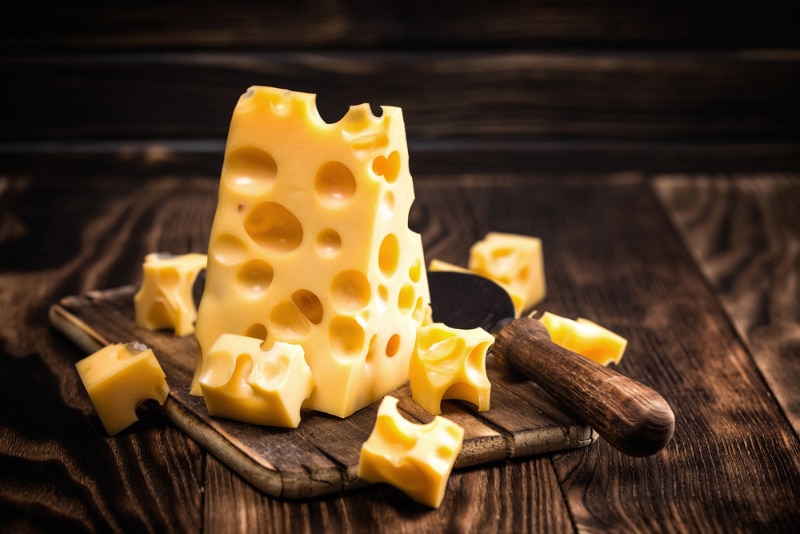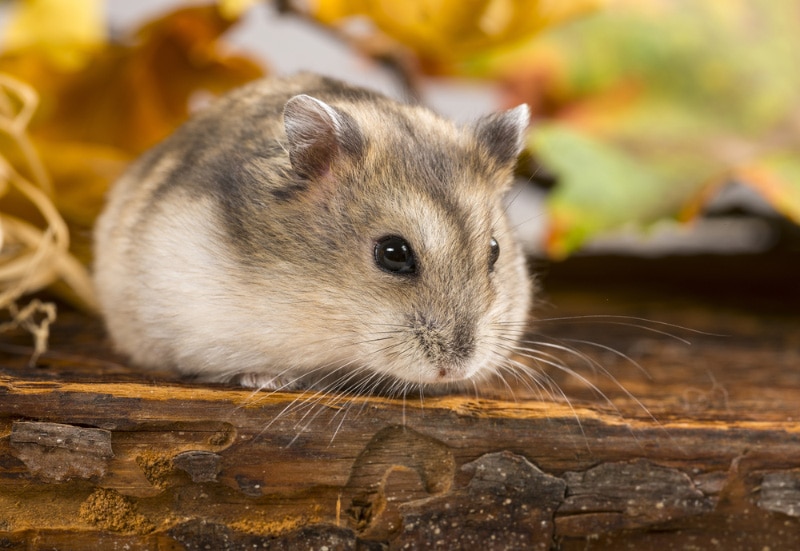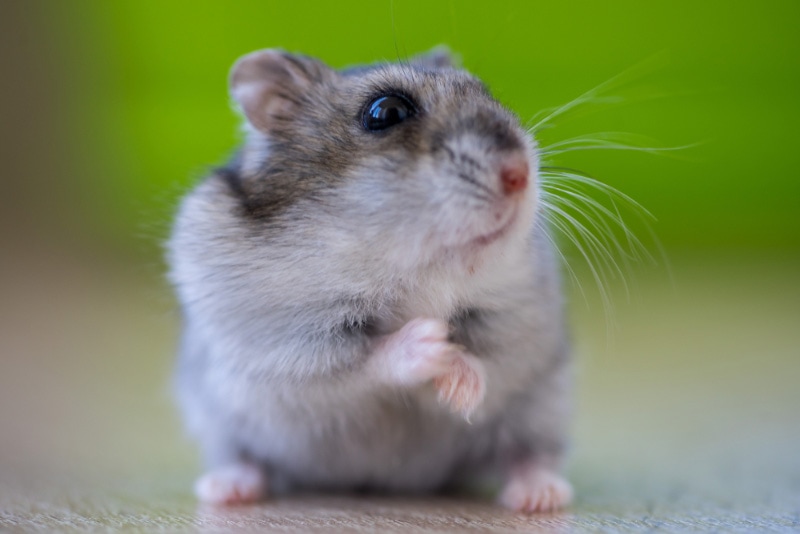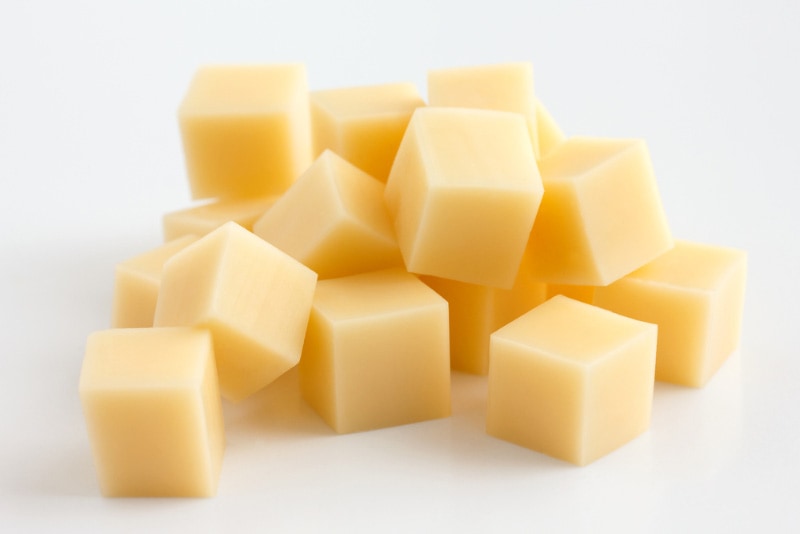Can Hamsters Eat Cheese? Vet Reviewed Nutritional Value & FAQ

Updated on

Click to Skip Ahead
As hamster owners, we’re always cautious about what we feed our little furry friends. One common question that pops up is: “Can hamsters eat cheese?” Yes they can, but this yes comes with conditions. In this comprehensive guide, we delve into the details about feeding cheese to hamsters.
Nutritional Value of Cheese vs Hamster Dietary Needs
Cheese is high in protein and calcium, making it beneficial for bone health. It also contains essential nutrients like vitamin A, B12, zinc, and phosphorus. However, it’s also calorie-dense and high in fat.
Hamsters need a balanced diet consisting of proteins, carbohydrates, and small amounts of fats. They also require fiber for a healthy digestive system. While cheese can contribute to the protein part of their diet, its high-fat content can lead to obesity and other health issues if fed in excess.

Impact on a Hamster’s Digestive System
Hamsters have a sensitive digestive system and although most can handle a little bit of cheese, it should be given sparingly. Too much cheese can lead to stomach upset or diarrhea. Remember, cheese is not a natural part of a hamster’s diet, so their bodies aren’t designed to digest large quantities of it.
Health Benefits and Risks
In moderation, cheese can provide your hamster with essential nutrients. The protein aids in growth and cell repair, while the calcium contributes to bone health. However, due to its high fat and sodium content, excessive consumption can lead to obesity, high blood pressure, and even kidney problems.
Furthermore, hamsters are prone to diabetes, and a high-fat diet can increase the risk of this disease. So, while cheese can be a tasty treat, it should only be given occasionally and in small quantities.
Types of Cheese
There are many types of cheese, but not all are suitable for hamsters. Hard and soft cheeses can be eaten by hamsters, but they need to be low in fat and salt. Mild cheddar, pasteurized goat cheese, and particularly cottage cheese, which is low in fat and high in protein, are good options.
However, some cheeses should never be fed to your hamster. Stilton and blue cheese, for instance, are toxic to them. Always ensure the cheese you offer is safe and suitable for hamsters.

Quantity of Cheese
When it comes to feeding cheese to your hamster, less is best. A tiny cube, no larger than 1 cm, once or twice a week is plenty. It’s important to remember that treats like cheese should not make up more than 10% of your hamster’s diet.
Using Cheese as a Reward
Cheese can be a great way to do some training or bonding with your hamster. As a much sought-after treat, using tiny pieces as a reward can help you exercise, train, and endear yourself to your tiny friend!
How to Tell When Your Hamster Has Had Too Much Cheese
If you feed your hamster too much cheese, it can lead to obesity and other health issues. Signs of overfeeding include lethargy, excessive weight gain, and digestive problems like bloating or diarrhea. If your hamster is displaying any of these signs, cut down on the amount of cheese you give them.

Tips for Offering Cheese to Your Hamster
- Start with one tiny cube (no larger than 1 cm) and observe your pet for any adverse reactions.
- Offer cheese once or twice a week, no more than 10% of their diet.
- Remove any uneaten cheese from the cage after a few hours to prevent spoilage.
- Baby hamsters have different nutritional needs and should not be given cheese.
With the right type and amount of cheese, your hamster can enjoy a tasty treat without suffering any ill-effects. Don’t forget to offer other healthy snacks such as fresh fruits and vegetables to ensure they receive all the nutrients they need for optimum health.
And always remember: moderation is key!
FAQs About Hamsters and Cheese
Can cheese replace the regular meals of my hamster?
No, cheese should not replace your hamster’s regular meals. It should only be an occasional treat. The majority of a hamster’s diet should consist of high-quality hay, hamster pellets, small insects, mealworms, and fresh leafy greens. Things like seeds, nuts, fruits, vegetables and cheese can be offered for variety, but not form part of their primary diet.
Can hamsters eat cheese puffs?
Although cheese puffs may seem like a fun treat, they’re not ideal for hamsters due to their high salt and artificial flavoring content.
How should I introduce cheese to my hamster’s diet?
Introduce cheese slowly into your hamster’s diet. Start with a tiny piece and observe your pet for any adverse reactions. If your hamster tolerates cheese well, you can continue to give it as a treat occasionally.

Can hamsters digest cheese easily?
Hamsters have a sensitive digestive system and aren’t designed to digest large quantities of cheese. Too much cheese can lead to stomach upset or diarrhea.
Can cheese cause kidney problems in hamsters?
While there isn’t direct evidence linking cheese to kidney problems in hamsters, its high sodium content, if consumed excessively, can potentially lead to high blood pressure and strain on the kidneys. However, this would only happen if they were to eat a lot of cheese.
Are lactose-free cheeses better for hamsters?
Lactose-free cheeses can be a good option if you notice your hamster has a sensitivity to lactose. However, they still contain fat and should be given sparingly.
Conclusion
Cheese can be an enjoyable treat for hamsters but it should only be given in moderation. When selecting a type of cheese, opt for low-fat and low-salt varieties such as cottage cheese, mild cheddar, or pasteurized goat cheese. Avoid cheeses that are dangerous for hamsters, such as Stilton and blue cheese, to keep your pet safe. Lastly, always portion the cheese into small cubes no larger than 1 cm and offer it sparingly as part of a balanced diet. With these tips in mind, your hamster can enjoy cheese as a tasty treat from time to time!
See Also:
Featured Image Credit: Sunny Forest, Shutterstock












